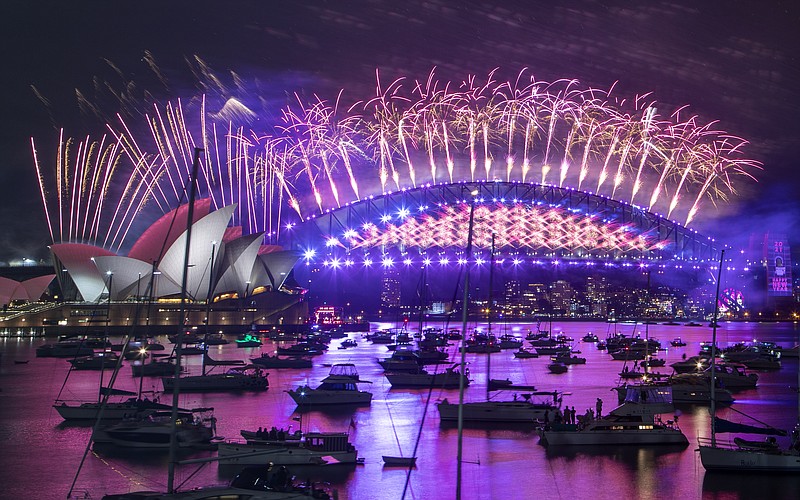CANBERRA, Australia — This New Year's Eve is being celebrated like no other in most of the world, with pandemic restrictions limiting crowds and many bidding farewell to a year they'd prefer to forget.
As the clock struck midnight across Asia and the South Pacific, the New Year's experience mirrored countries' responses to the virus itself. Some canceled or scaled back festivities, while others without active outbreaks were able to carry on like any other year.
Australia was among the first to ring in 2021 because of its proximity to the international date line. In past years 1 million people crowded Sydney's harbor to watch fireworks. This time, most watched on television as authorities urged residents to stay home and the most populous states, New South Wales and Victoria, battled new outbreaks.
Famous night spots were eerily deserted. The seven minutes of pyrotechnics that lit up the Sydney Harbor Bridge and its surroundings at midnight brought momentary cheer. Melbourne, Australia's second-most populated city, called off its annual fireworks show.
In South Korea, Seoul's city government canceled its annual New Year's Eve bell-ringing ceremony in the Jongno neighborhood for the first time since the event was first held in 1953, months after the end of the Korean War. The ceremony normally draws an estimated 100,000 people.
Cities and countries that have managed to control the virus got to celebrate. New Zealand, which is two hours ahead of Sydney, and several of its South Pacific island neighbors that also have no active covid-19 cases held their usual New Year's activities.
Taiwan also hosted its usual New Year's celebration, a fireworks display by its capital city's iconic Taipei 101 tower. The island has registered only seven deaths and 700 confirmed cases.
In Chinese societies, the virus ensured more muted celebrations of the solar New Year, which is less widely observed than the Lunar New Year that in 2021 will fall in February. Initial reports about a mystery respiratory illness sickening people in the Chinese city of Wuhan emerged exactly a year ago.
Much of Japan welcomed 2021 quietly at home, alarmed after Tokyo reported a record daily number of confirmed coronavirus cases, topping 1,000 for the first time. Many skipped a chance to return to ancestral homes for the holidays, hoping to lessen health risks for extended families.
Emperor Naruhito will deliver a video message for the new year, instead of waving to cheering crowds from a balcony outside the palace.
Millions of Indians were ushering in the new year with subdued celebrations at home because of night curfews, a ban on beach parties and restrictions on movement in major cities and towns after the new, more contagious variant of the virus reached the country.
In New Delhi, Mumbai and Chennai, hotels and bars were ordered to shut at 11 p.m. The cities have been the worst hit by the pandemic. Drones were keeping watch on people's movements in Mumbai, India's financial and entertainment capital. Large gatherings were banned.
Despite a surge in infections, the Gulf hub of Dubai pressed ahead with its mass New Year's Eve celebrations, including the annual fireworks show around the Burj Khalifa, the world's tallest tower.
For some, the virus restrictions spoiled the fun.
"People come to Dubai because it's open, but there are so many rules," said Bashir Shehu, 50, who was visiting from Abuja, Nigeria with his family. "We pray that next year we can celebrate with some real freedom."
In many European countries, authorities warned they were ready to clamp down on revelers who breached public health rules, including nightly curfews in Italy, Turkey, Latvia and the Czech Republic.
Some public celebrations were planned, such as a fireworks display over Rome's Coliseum, but officials urged people to enjoy them from their balconies or — better yet — at home, on television.
A few families gathered in Madrid's sunny central Puerta de Sol square to listen to the rehearsal of the traditional ringing of the bells that is held at midnight. They followed the Spanish custom of eating 12 grapes with each stroke of the bells before police cleared the area that normally hosts thousands of revelers.
The British government, trying to juggle the twin challenges of a pandemic and the UK's definitive split from the EU, ran ads imploring the public to "see in the New Year safely at home." Most of England's population is under lockdown measures in an attempt to slow the spread of the new virus variant.
Many around the world looked toward 2021 with hope, partly due to the arrival of vaccines that offer a chance of beating the pandemic.
"Goodbye, 2020. Here comes something better: 2021," said New York City's Mayor Bill de Blasio.
While there won't be crowds in Times Square, the mayor pledged that the city which has over 25,000 deaths from the virus would rebound next year.
"We are turning the page and going someplace better," de Blasio said.
In Israel's coastal metropolis of Tel Aviv, flower shop owner Billie Heyman reflected on how 2020 taught people to be "more friendly and gentler with each other."
"Because, when we don't have this, we have nothing," she said.
Jordans reported from Bonn, Germany. AP reporters around the world contributed to this report.
